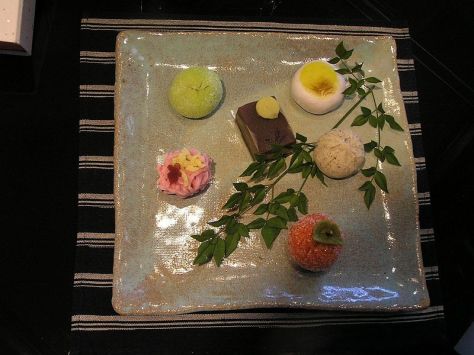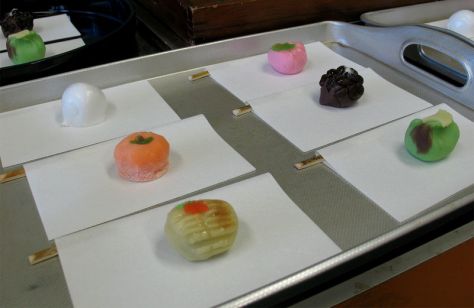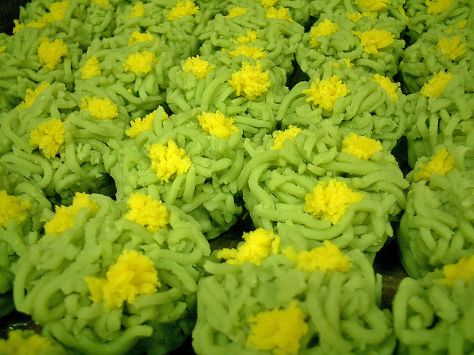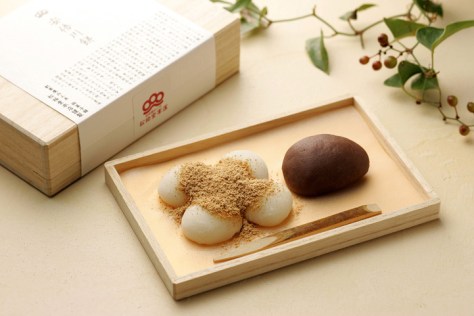
There is a traditional way of making cakes in Japan that ought to please no end vegans, vegetarians and people allergic to wheat flour and dairy products, namely Wagashi!
Wagashi (和菓子) is a traditional Japanese confectionery which is often served with tea, especially the types made of mochi, azuki bean paste, and fruits.
Wagashi is typically made from naturally based (mainly plant) ingredients. The names used for wagashi commonly fit a formula—a natural beauty and a word from ancient literature; they are thus often written with hyōgaiji (kanji that are not commonly used or known), and are glossed with furigana (phonetic writing).
Generally, confectioneries that were introduced from the West after the Meiji Restoration (1868) are not considered wagashi. Most sorts of Okinawan confectionery and those originating in Europe or China that use ingredients alien to traditional Japanese cuisine, e.g., kasutera, are only rarely referred to as wagashi.

Assortment of wagashi for a tea ceremony
During the Edo period, the production of sugarcane in Okinawa became highly productive, and low quality brown sugar as well as heavily processed white sugar became widely available. A type of sugar, wasanbon, was perfected in this period and is still used exclusively to make wagashi. Wagashi was a popular gift between samurai, in significance much like a good wine. Wagashi is served as part of a Japanese tea ceremony, and serving a good seasonal wagashi shows one’s educational background.

Wagashi in the shape of rape flowers/Na no Hana
There are many, many kinds of Wagashi!
I will introduce them in the next postings, followed by other postings on the basic preparation.

Shizuoka’s Abekawa Mochi
Just know that about every region in Japan has its own traditional Wagashi!
Availability:
Wagashi is widely available in Japan, but quite rare outside it.
Minamoto Kitchoan (源 吉兆庵)
Has a varied selection, and stores in New York City (shipping throughout the US), London (shipping throughout Europe), and Singapore, in addition to Japan.
Toraya (とらや)
Has a full Paris store, stores in Japan, and sells a limited selection (yōkan only) at New York stores.
Fugetsu-do
Family owned and operated in the USA, since 1903, Fugetsu-do now ships anywhere in the USA.
RECOMMENDED RELATED WEBSITES
So Good Sushi Restaurant in Nice France
Navigating Nagoya by Paige, Shop with Intent by Debbie, BULA KANA in Fiji, Kraemer’s Culinary blog by Frank Kraemer in New York,Tokyo Food File by Robbie Swinnerton, Green Tea Club by Satoshi Nihonyanagi in Shizuoka!, Mind Some by Tina in Taiwan, Le Manger by Camille Oger (French), The Indian Tourist, Masala Herb by Helene Dsouza in Goa, India, Mummy I Can Cook! by Shu Han in London, Pie
rre.Cuisine, Francescannotwrite, My White Kitchen, Foodhoe, Chucks Eats, Things that Fizz & Stuff, Five Euro Food by Charles,Red Shallot Kitchen by Priscilla,With a Glass, Nami | Just One Cookbook, Peach Farm Studio, Clumsyfingers by Xethia, PepperBento, Hapabento, Kitchen Cow, Lunch In A Box, Susan at Arkonlite, Vegan Lunch Box; Tokyo Tom Baker, Daily Food Porn/Osaka, Only Nature Food Porn, Happy Little Bento, J-Mama’s Kitchen, Cook, Eat, Play, Repeat, Bento Lunch Blog (German), Adventures In Bento, Anna The Red’s Bento Factory, Ohayo Bento,
Must-see tasting websites:
-Sake: Ichi For The Michi by Rebekah Wilson-Lye in Tokyo, Tokyo Through The Drinking Glass, Tokyo Foodcast, Urban Sake, Sake World
-Wine: Palate To Pen, Warren Bobrow, Cellar Tours, Ancient Fire Wines Blog
-Beer: Another Pint, Please!, Beering In Good Mind: All about Craft Beer in Kansai by Nevitt Reagan!
ABRACADABREW, Magical Craftbeer from Japan
-Whisky: Nonjatta: All about whisky in Japan by Stefan Van Eycken
-Japanese Pottery to enjoy your favourite drinks: Yellin Yakimono Gallery

Looking forward to more in-depth information about wagashi.
There is a local wagashi shop here in Ryogoku, dating back some decades. They make it in the large kitchen, I think. Every new years time they produce mochi, many of the three-tiered round mochi going to the local sumo houses. It’s a great part of daily life, too.
LikeLike
Coming soon!
LikeLike